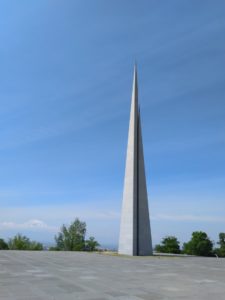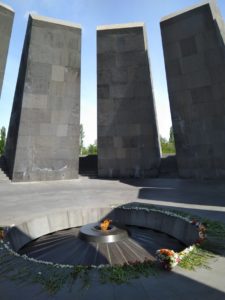 I am not an Armenian (being neither a citizen of that country, nor of Armenian origin), even though the land of my birth, India, was, once upon a time, home to a large diaspora of Armenians, with their history going back to 795 AD when the first Armenian, Thomas Cana, landed on the Malabar coast of the present day Kerala State. Though there are now very few Armenians left in India, the indelible marks they left are there for all to see—churches, schools, businesses, and, of course, the khachkars (crosses carved in stone) in many parts of India, but most of all in Kolkata and Chennai. By the way, the first ever newspaper in the Armenian language, anywhere in the world, was published, not in Armenia, but in Chennai (then Madras) on October 16, 1874.
I am not an Armenian (being neither a citizen of that country, nor of Armenian origin), even though the land of my birth, India, was, once upon a time, home to a large diaspora of Armenians, with their history going back to 795 AD when the first Armenian, Thomas Cana, landed on the Malabar coast of the present day Kerala State. Though there are now very few Armenians left in India, the indelible marks they left are there for all to see—churches, schools, businesses, and, of course, the khachkars (crosses carved in stone) in many parts of India, but most of all in Kolkata and Chennai. By the way, the first ever newspaper in the Armenian language, anywhere in the world, was published, not in Armenia, but in Chennai (then Madras) on October 16, 1874.
But the Indian connection is not why, every year, I join hands with my Armenian friends, on the 24th April, to solemnly observe the genocide perpetrated by the Ottomans—a genocide that killed more than 1.5 million Armenian men, women, and even children.
A business visit to Armenia in 2006 was what started my love affair with this small (roughly the same area as Maryland), landlocked nation. The hospitality I experienced (even from total strangers), the natural beauty of the mountainous terrain (including the magnificent Mount Ararat), the delectable Armenian cuisine (lavash and tzhvzhik), the best cognac in the world and the widest variety of wines, the combination of aesthetics and utilitarianism, the love of poetry (Charents and Sayat Nova) and literature (too many to name, but including the great American writer, William Saroyan), and music (Komitas and Khachaturian) … I could go on.
Simply put, Armenia is a country I love, admire, and cherish.
On every trip to Armenia (and I try to go there at least once every year, if possible), I make it a point to visit the Genocide Memorial, in the capital city of Yerevan, to pay humble homage to the victims of the Genocide. It is always a somber  occasion to stand in silence before the eternal flame surrounded by the twelve towering slabs of stone representing the twelve Armenian provinces that are now in present-day Turkey. The museum next to the memorial preserves the heartbreaking and irrefutable evidence of the crime. It is not easy to leave the museum without feelings of horror, nausea, helpless anger, and deep grief.
occasion to stand in silence before the eternal flame surrounded by the twelve towering slabs of stone representing the twelve Armenian provinces that are now in present-day Turkey. The museum next to the memorial preserves the heartbreaking and irrefutable evidence of the crime. It is not easy to leave the museum without feelings of horror, nausea, helpless anger, and deep grief.
There are friends who mention other genocides that have taken place after and wonder why I commemorate the Armenian Genocide the most of all. The answer is simple. More than my love for Armenia and Armenians, it is the continued denial of the genocide by Turkey, whose predecessor the Ottoman Empire committed this horrendous crime against humanity, not just Armenians, that galls me.
How can anyone say that the Armenian Genocide did not happen? The terrible event, a blot on humanity, has been indisputably documented by a wide variety of witnesses and historians. There can be no doubt at all that it happened. In Turkey today, thousands of desecrated Armenian churches and ruined homes stand as mute, but still eloquent, witnesses of the massacre and the forced march of tens of thousands through the desert to their deaths. Turkey, as a nation, continues to deny the enormity of the crimes that were committed, probably to avoid having to make restitution and pay compensation to the descendants of those who were killed or driven out of their homes leaving everything behind. But denial to compensate is a different matter from denying that the event ever happened.
I cannot, for a moment, imagine the colossal weight of the brutal genocide of 1.5 million of their forebears that Armenians carry. Hardly any Armenian family has been left untouched. The people of Armenia and the vast diaspora still stoically bear the pain and sorrow of this terrible event and nurse their righteous anger at the continued denial of this tragedy.
How would I feel today if it had been my own forefathers that were massacred in a similar fashion? That is a question I ask myself every so often, but especially today.
On the 24th of April 1915, one hundred members of the Armenian intelligentsia were publicly executed, and that day was chosen to commemorate the Armenian Genocide.
On this day, 105 years later, I stand in solidarity with Armenians to remember and to grieve with them.


One of the worst genocides in history. Share your pain.
Thank you for reading ‘For the Love of Armine’ just before the Armenian Genocide Remembrance Day, Dominic.
Dear Abie. For me, as an Armenian, is a huge relief to read these beautiful thoughts. Thank you very very much for your always honoring feedback about Armenia and Armenians!
Husik jan, Armenia and Armenians have made my life more beautiful than it would have been otherwise. Thank you.
Thank you Abie jan for your thoughts and for remembering the 105th Armenian Genocide Day.
Andranik jan, I did not know about the Armenian Genocide till I visited Yerevan in 2006 and since my first visit to the Genocide Memorial can never forget it.
Many facets of the genocide were unknown to me. Thanks for the enlightening remembrance.
Thank you for reading, Dulal. Kolkata, where you are, was probably the center of the Armenian presence in India.
Thank you for a great story! It’s unbelievable that the genocide is still doubted or denied, as people who fled Turkey with their families when they were children are spread out all around the world. It is a shame for me that people in US know more about Kardashian family, than about the fact that so many people were destroyed in a day for no reason or warning!
Armine jan, thank you for reading. I agree, more people need to know of the Armenian Genocide and the tenacity of the Armenian people to overcome so great a tragedy.